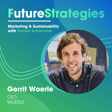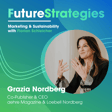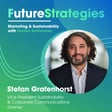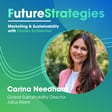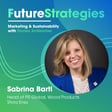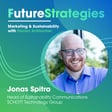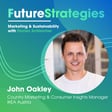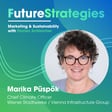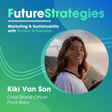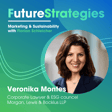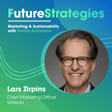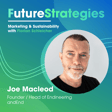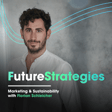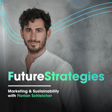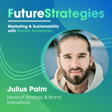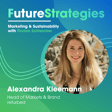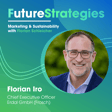The Importance of Sustainability Across Sectors
00:00:00
Speaker
I agree with you. I would wish that we talk more about sustainability and that it's more of a consistent, like permanent thing that's always raised, not just in marketing teams. In every company, every company has a little bit of leeway to contribute in their way, even if it's a small business, even if it's a startup. And I think that the one thing is that it goes back to super simple psychology, but because it's a bit of a doom scenario, we don't like talking about it.
00:00:28
Speaker
And we maybe don't like it as much as something that's shiny and new, as you said, as AI.
Podcast Introduction: Focus on Sustainable Growth
00:00:34
Speaker
Hello, and welcome to Future Strategies. I'm your host, Florian Schleicher. You want your marketing to achieve goals and sustainable growth? You have come to the right place. In this podcast, I talk with marketing experts and share my own know-how on how to bring your marketing to the next level with a lot of inspiration and learnings, all without the usual hustle. So let's jump right into it.
Guest Introduction: Cordola Blüge's Journey
00:01:02
Speaker
Today, I'm talking with Cordola Blüge, Marketing Director at The Next Web Conference. With a background in psychology, Cordola has been in marketing for almost a decade, helping brands launch on social and supporting startups on their growth journey. She previously ran her own social media consultancy and holds the function of early stage advisor at a VC fund.
00:01:27
Speaker
Cordola was also part of the founding team of a women-focused online education startup called Future Females. Cordola has also worked on marketing projects in three different countries before landing her current role with the NextWeb in Amsterdam. Now she's in charge of a 10-people strong marketing team and leads the overall brand strategy for the NextWeb and the marketing efforts around its annual Amsterdam conference.
AI and Sustainability in Marketing
00:01:56
Speaker
Welcome to the show, Karola. Thank you so much. I'm so happy to have this conversation with you. I have actually been looking forward to this interview for a couple of weeks now because we agreed to talk about two of the most discussed topics in our marketing sphere right now, which is AI and sustainability.
00:02:19
Speaker
But before we dive deeper into that, can you please give us a short introduction on what the Next Web Conference is doing and why you also chose this company as your next endeavor? Yeah, sure. So the Next Web is a unique, very unique company, and we are kind of divided into four business units. One part, one very, very important part, and that's where most people know us from,
00:02:46
Speaker
is the next web conference. It's an annual conference, happens every year in Amsterdam and it's been going, it was the 17th edition this year, it's been going for a while and it really brings together the brightest minds in tech and it kind of tries to showcase what's next in tech. That was always the focus point of T&W. It was like we want to be at the forefront, we want to educate
00:03:11
Speaker
people around what's next in tech. How do we do that? We do that with a conference where we bring everyone together. And then secondly, we also do this with content. So the next web has a website, the next web.com, where very talented journalists write about technology trends.
00:03:28
Speaker
And that website has also become the go-to destination for a lot of people that work in technology to find out about latest trends, innovation, and so on. So the two things really combine a lot that's going on in technology already, but then we also still
00:03:43
Speaker
have the co-working space. So our office is in the heart of Amsterdam and it's a big co-working space and we have a second one in the west of Amsterdam. And then as the fourth pillar of the whole organization, there's a consulting arm that's T&W programs at the moment.
00:03:58
Speaker
It's the consulting part of the business that helps big corporations and governments also with open innovation projects. So consulting them and using this knowledge that we have accumulated. So in my role now, I have worked a lot on the conference, on the marketing for the conference, the one that's in Amsterdam. And we also held one for the first time this year in Valencia in March for the first time.
00:04:25
Speaker
And, but I've also tried to holistically bring together all the different business arms of the company because they're all intertwined in the end and marketing is needed for all of them. It just so happens.
00:04:37
Speaker
that the conference is why a lot of people kind of know
Cordola's Career Transition and Insights
00:04:41
Speaker
us. And that's why it's great to talk about specifically AI today and sustainability because these two aspects were really present also at our conference stages. We heard a lot about AI, but then also in marketing, you really need to be on top of it. And then sustainability we'll talk about because it is getting more and more important to also be
00:05:03
Speaker
sustainable in the event industry, in the Black broader event industry and how you can really do that. I think we proved ourselves well this year with a really, really good strategy and execution and how it worked out was really, I think, something to be proud of as an event company.
00:05:21
Speaker
Cool. I'd love to talk about that a little bit later. But about the second question, why did you end up at the next web conference? Why did you say, okay, I have seen enough of the startup world or what was behind that?
00:05:35
Speaker
Yeah. So, I mean, my journey in marketing started now a decade ago, almost. I started, came from psychology, complete different industry. I worked as a clinical psychologist and I really was so always fascinated by how quickly everything was changing in marketing, how quickly back then everything was changing in social media. And at that time I had a lot of entrepreneurial friends. They all started their startups and I thought it was interesting how
00:06:01
Speaker
how much changes there, how much innovation comes and how much as a marketeer you could contribute to that whole industry. So I started in social media marketing and that's where I kind of grew into my bigger marketing profile. And then I worked in South Africa for a long period. I worked for a luxury travel company, which is really amazing to be able to do marketing for a travel company because you're kind of really selling this, not selling this product, you're selling this overall lifestyle and feeling of travel.
00:06:31
Speaker
And after that, I joined a super early startup. That's the company that you mentioned, Future Females. And in the very beginning, after three months of incubation or so with the founding team, and we kind of became this team that was there from the beginning, pre-revenue, really building this first community-based company that this broader idea to really bring more women into business. How can we help more women to become entrepreneurs?
00:07:01
Speaker
was the overall goal. And from there, I kind of went the whole startup journey together with Future Female from very early, then changing, working for them full time. First, I was the Europe director of the company, and then my role pivoted into the CMO of the company. And I spent quite a lot of long time with them. And then at that point, when I was
00:07:23
Speaker
Uh, feeling like it would be, I would be ready for something new. It wasn't because I wasn't, uh, still believe in the mission for the company. But you also, at that point, when you've gone through the startup cycle once in marketing and generally as a, as a person, you want to, you have to sometimes this, uh, urge to see some, some different business models or some different businesses still. And at that point, I think in, in, after gaining a lot of experience and working for a startup.
00:07:51
Speaker
I wanted to work at a, not a huge corporate sense, but at a bigger company, was already established and already had something like a certain product or a certain vision, and that I could then build a team within there. And so this role that I was joined, when I joined the next web, the role was a new role that they were kind of implementing into company now, giving marketing more power.
00:08:19
Speaker
before the marketing team was only focused on the event. And it was not specifically for the whole T&W brand. And this was the time they said, we're creating a role that will encompass all of the different units. It will work with everyone it should bring together and align the different business units. And for me, that was a super interesting challenge at the time. And also to see how a company like that that got bought by the Financial Times two years ago.
00:08:45
Speaker
operates now and how they work with different business units and how this product, this big, big tech conference is being utilized for marketing, how the marketing is different for a product like that as to what I did before, which was very much.
00:09:01
Speaker
startup marketing, I would call it, also like scaling always super, super tight budgets, always everything testing very quickly, failing very quickly and bringing everything to market, which also has its upsides. But I really also liked having a bigger team, having a bigger pool of resources of other experts in the company that I could tap into. And that's why I took the role. Yeah. Do you sometimes miss the startup world? Yes. I miss it a lot, actually.
00:09:31
Speaker
And the things that your work can really have an impact immediately. And if you're a tight-knit team or a small team, you maybe have like three decision makers or four and you come up with something and you can really execute it together fairly quickly in new corporates or in even a mid-sized company that always takes
00:09:52
Speaker
long. And there's so many people to consider and also other decision makers, that it sometimes slows down the process. But also, yeah, that's that's what I loved about I really love the incubation phase of something and I really love making things bigger scaling and and coming up with an idea from scratch and then delivering that. So that's what I always loved about
AI's Role in Marketing Efficiency and Creativity
00:10:19
Speaker
In a startup where I've also consulted on a lot of startups because it's still where like I see so much potential. If you bring expert knowledge to a startup, I've worked with you as an advisor or in the sense of like marketing advice, you can bring so much value to them quickly and they're really appreciative without having to dedicate all your time. So that's where the advisor concept or mentor concept comes in. Yeah.
00:10:46
Speaker
I can so relate to that because I started an advertising agency, then I worked for McDonald's. So super big corporate company, then went on the NGO side to Greenpeace. And then most recently I was head of marketing at Too Good to Go. So Too Good to Go was really the point where I thought, okay, I really can make use of all the things that I have learned now to put into a startup.
00:11:10
Speaker
And the most fascinating thing was, as you mentioned, this thing at the very beginning, nobody knows about you. And then two years later, everybody knows the brand name. And that's such a rewarding feeling to know, okay, I was part of this and it's an amazing journey. I think we could go on about this much more, but we said we would talk about AI and everybody's talking about AI right now.
00:11:38
Speaker
At least it feels like that. So things are moving at an incredible speed right now. I remember I wrote a blog posting in March, and while the underlying theme still applies, a lot of the examples already feel super outdated. So I would like to kick off our conversation with kind of a provocative statement. I just read today that Emad Mostak, the founder and CEO of Stability AI,
00:12:03
Speaker
set at a summit to Bloomberg that AI is a $1 trillion investment opportunity, but it will be the biggest bubble of all time. And he says, I called it the .AI bubble and it hasn't even started yet. What's your take on that? Is AI just another bubble? Yeah, that's so interesting that he said that because I also just heard on the podcast this week that for the first time traffic is down for chat GBT.
00:12:33
Speaker
since its inception. It's down 10%, which is obviously is also summer. Sometimes you could blame it on that. But it's also the initial hype always has a period where it dampens a bit.
00:12:44
Speaker
I think where he's right is that at the moment I see so many startups and companies popping up and creating their own API and trying to work with AI or claim working with AI more. We saw it at the conference. We had AI as one of the key themes and it was very in demand, but also a lot of people then said it was almost too much AI. There are other things at the conference too. So this was interesting feedback we got. So I do think
00:13:14
Speaker
That's always when we have these big leaps forward. There will be a bubble effect, but I do think that there's also not a way, how we already advanced now, since let's call the inception TFT in November, right? Now it's half a year. That's not reversible.
00:13:33
Speaker
I think we went forward irreversibly, so we are there now. And from there onwards, there will be changes and it will impact the job market, it will impact marketing, and it will impact technology and how companies go forward now. So I do think what we can take away from it is with every bubble be a bit
00:13:56
Speaker
critical still, we saw it with the metaverse, for instance. It was a huge bubble and now you're looking back at it and you think, where did this all this grow? Where did this go? Yeah, exactly. And I feel like it's kind of like this new shiny thing syndrome. I mean, in marketing, we're also aware of the novelty effect. Everything that is new is cool.
00:14:19
Speaker
And it's like if a kid finds a new toy and for the first couple of days or weeks, this will be the most exciting thing. And then a couple of months later, it will lie back in a corner and it will be just another toy. So I think one good thought behind evaluating what a real trend or a bubble is, and it has worked for me as the question, does this new thing fulfill any pre-existing needs of people?
00:14:48
Speaker
And so I would be very, very interested in what do you think marketing can do with AI now that it was not able to do before? So does it fulfill a need? Yeah. So the interesting question, the part of the question is, is there something new it can add?
00:15:07
Speaker
Or is it making us just more efficient? And is it really saving us so much time that we can do much more with less people, that we can automate more? And this has kind of been my experience of the early months this year. It wasn't replacing something that we couldn't do at all. It was giving us way quicker, like for instance, that the easy ones that came up at the beginning of this year were always copywriting search.
00:15:35
Speaker
coming up with different brainstorming ideas, but on a simplified level. And that we were quite amazed by, but very soon we integrated that, at least at marketeers. Now everyone knows, at least to a certain degree, you need to be able to prompt well, and then you really get very quickly what a copywriter would probably take, probably two hours, three hours to deliver for you. So a big chunk of marketing teams was always a lot
00:16:01
Speaker
copywriting, a lot of research and compiling information in a presentation then or in some day. This is all things now that we can do way quicker. So now in marketing, I would say if you are not implementing and using AI, you're really not doing yourself a favor. There was also this statement, AI is not going to take your job, but a person that has AI knowledge will.
00:16:27
Speaker
You know, if I would want to hire in marketing in a more senior position, I would at least want to see that there's knowledge of all these tools and at least some form of user, like the person being able to use them well. And I talk and knowing for what. So the leaps for me in the AI since March, particularly where what I was really impatient to wait, like really now I'm happy that it's coming into place is visualization of data.
00:16:57
Speaker
Cause in the phase of chat GPT, we didn't see that it was really weak. It couldn't visualize. And now we I'm seeing now this week, last week I tested it, um, the first plugins and that's, uh, with a plugin called notable where it can really visualize your data super well. Um, so you give it the data points like that could be any graph. So what we use market is usually do with, um, with a visualization tool, uh, like super metrics or, um, locker room, previous data studio and so on.
00:17:27
Speaker
This is way quicker. This gives a huge data pool input and you ask it and you prompt it well. You can even use the prompts act like a data engineer. So all the people that work with data on the intersection of marketing and product and tech.
00:17:41
Speaker
And it gives you this within seconds. And I'm quite impressed with that whole thing, because this is what we work with in marketing. We need to come up with creative, innovative solutions, but we also need to base a lot of what we do on data. So coming up with visualization was one of the really new innovation things for me, that I really want to go much more deep into now and everything that happens in marketing till the end of the year.
00:18:07
Speaker
You really need to know what is the latest, which tool has come out now. Even now when you are working on early projects, visual creation with Mid-Journey is such a game changer. I'm not saying that this will make the designers
00:18:24
Speaker
obsolete. We really need good designers and people, especially people who understand brand, brand font, brand branding, what a brand stands for, the brand values to really incorporate that in a bigger brand strategy, but to come up with easier, smaller things that you just need for your social media deck or for one at once a presentation. It just, uh, leaped us forward so much that I think it's hard to ignore now and to, um, really think as a marketeer,
00:18:54
Speaker
of ways how you can optimize processes, automate, save time on all these tasks so your team can spend the time being creative or working on proactive ideas. At the moment, what I find with JetGPT, because it's also taking from the internet old information, it doesn't come up with super innovative things. That's a super interesting point that you just mentioned, because
00:19:19
Speaker
Kevin Kelly wrote this a couple of weeks ago, where he said, since the generated AI's have been trained on the entirety of human work, most of it is mediocre. It provides wisdom of the crowd like results, and they may hit the mark, but only because they are average is what he said. And I think the interesting thing is, this is something that is in my mind is,
00:19:42
Speaker
I think there is a perfect place for this because if you compare it to like the craft beer industry, yes, you can get a perfect pint from Heineken, for example. But sometimes people want a variance and a story about some things more interesting. And that is what craft beer then offers. So I think there's a market for both.
00:20:11
Speaker
And I think it won't really replace the great work out there, but it will give you a good basic understanding of needs very fast. And that's, I think, one of the benefits also for marketing because oftentimes we need to understand concepts and with its feature to really narrow down things. And if you put in, like you said, the right questions, then you will get something good out of it.
00:20:40
Speaker
What tools do you personally find the most fascinating? You talked a little bit about the visualization part, but is there something else that you really say, okay, this is blowing my mind. Yeah. I mean, the visualization, that's a really, really great one. But even if you had to present your brand strategy or an overall strategy, like the way it now, for instance, integrates with Miro, Miro has its own AI and it builds something for you that's
00:21:09
Speaker
visually looks great. It's not just a spreadsheet or a slide or an image, but then it also comes up and clusters your kind of the information that you input. I think that's something that I personally found super, super helpful. And then we have, we had one super practical example, but this is typically for everyone who works with lots of data. You in the event world or anywhere, you want to measure things, you want to measure age and
00:21:37
Speaker
and gender sometimes, and we, with the annual conference in Amsterdam, pride ourselves, for instance, that we have a lot of very high female attendance. So I'm saying that because for our conference in Valencia, we forgot to ask for gender specifically in the onboarding process. So now you end up with a list of 5,000 people, and you have the names of 5,000 people, and we don't have an accurate number of what was our gender ratio. So this literally happened.
00:22:07
Speaker
This is the prime example for now either someone would have manually program a formula that would have been not very accurate or someone had to go through all these even worse, but give it the language model. This is what actually language models are perfect at. You base it on European names and it can give you exactly on like, it's not a hundred percent accurate, but it's almost accurate because it bases this on the information we have, giving a female or a male name. Now we had our ratio of attendance.
00:22:37
Speaker
And this is a thing that wouldn't have been possible in 10 seconds, how I got it delivered last year. It was crazy. And it's like super simple if you hear about it, but getting there, super interesting. Yeah. I mean, imagine a programmer would just need to sit there and build a formula that kind of takes these names in. And that would have taken a long, long time. So this was something that we were able to do.
00:23:04
Speaker
And then generally the other example I have is where we really tested it against and now I'm making a case against AI, but this is earlier that the very innovative, like the brand new things that haven't been mediocrely produced in the past, this is what we can't do with AI yet.
00:23:24
Speaker
also had to come up with statements for our billboards all over Amsterdam ahead of time. Yeah, I saw them, yes. Yeah, and we went, we did put in AI, so we kind of had the test, and then we gave the team, the whole team could, each one contributed and had their best ideas. And then we chose the ones that we thought were the best, and then none of them was from the AI. We really put these kind of head turning moments that Oatly creates, for instance, with the billboard, that I think we really had a really good one.
00:23:53
Speaker
And this is when you need people that understand what the brand is. So in our case, we went for one that was actually a chat TVT quote. So we had on all this big billboards over in Amsterdam and in the airport, we had
00:24:10
Speaker
Nothing replaces face-to-face events. JGBT. And it was in the layout of JGBT. Because it's so much, that's what we stand for with the conference. We do believe that. And then that I think got really good positive feedback. And the other one was much more visual and it took kind of took you back to that era of Rubik's Cube and paint and so on. We had these visuals on there.
00:24:36
Speaker
And it had the slogan under it that was like, let's go back to a time when the future excited us, you know? So it is kind of, you get it, give this people, they look at it, they see it and they're interested and you have this head. And AI couldn't come up with that. It also wouldn't know us well enough, even if we input everything about T&W to come up with something like that.
00:24:57
Speaker
So we did a few of these things, out of home things like stickers and the billboards. And I think that's where you really need creative people and you need the human creativity to come to play and come up with something great for the brand. Yeah, cool. I have seen those ads and I will come back to them later on because I have a question about that. But you already talked about what you think AI can't replace at the moment.
AI vs. Sustainability: Why AI Takes the Spotlight
00:25:27
Speaker
So we also covered that. And I would like to talk about next a challenge that we face because on the one hand side, this shiny new thing, AI, everybody's talking about it and it's super sexy as a topic. But on the other hand side, we have an urgency with the climate crisis and sustainability as an issue. Why do you think
00:25:56
Speaker
There is so much talk about AI and such a big fascination with something that is, to put it bluntly, a great tool and something nice to work with.
00:26:07
Speaker
and not so much about sustainability as an issue which has long lasting effects and will impact everybody's lives, not just of the marketing people who are super excited right now with AI or some tech people. Why do you think is that so that we have such a big disconnect in terms of what we talk about and why do we talk so much about AI and not so much about sustainability?
00:26:31
Speaker
Yeah, I agree with you. I would wish that we talk more about sustainability and that it's more of a consistent, like permanent thing that's always raised, not just in marketing teams, in every company, every company has
00:26:46
Speaker
has a little bit of leeway to contribute in their way, even if it's a small business, even if it's a startup. And I think that the one thing is that it goes back to super simple psychology, but because it's a bit of a doom scenario, we don't like talking about it. And we maybe don't like it as much as something that's shiny and new, as you said, as AI. So that's where
00:27:10
Speaker
I think sometimes we also feel that as a single one person, just me, there's so little I can do to change. And with the opposite side, you have a tool that within such a short period reached like millions and millions of people that jumped on it and used it. It was like, so I could easily go on it, use it for whatever I need it for and be part of this hype.
00:27:32
Speaker
There is such a barrier that we realize that we obviously we still all have a little bit of this potential in us to change something. And then the bigger potential is actually that we, as every single person, we are part of a bigger construct. You are in a company, I'm in a company, or we are part of various communities, or we are part of a family that we can influence. You always have this circle of influence. This is how we can actually have this.
00:28:01
Speaker
I do think having the discussions around it helps and there is definitely a synergy also where why is there not
AI Supporting Sustainability Efforts
00:28:10
Speaker
so much discussion? How can AI help us come up with solutions to battle climate change? But definitely there is but at the moment I feel what we're more like because that's how every revolution digital revolution also works like we focus on the things
00:28:26
Speaker
that are immediately the ones where we know it's going to make a lot of money or shareholder value. That's where the focus is going in AI. But I do also see that AI would have massive potential because of its capacity to work with big data to find us ways how we can measure and then reduce the carbon footprint. So I think there is some examples. In our small world at T&W conference,
00:28:55
Speaker
We also took sustainability measures. They were not executed or based on AI. That was actually my next question. So because the elephant in the room is obviously the event business has a reputation of being kind of a black sheep when it comes to sustainability because you have a big environmental and CO2 footprint. So what did you do at your most recent conference when it comes to sustainability?
Sustainability Actions at The Next Web Conference
00:29:22
Speaker
What did you come up with without AI?
00:29:25
Speaker
Yeah, so there's really a big shout out I have to give to the broader event team at TNW because they developed this strategy and executed this this year and also made it a priority.
00:29:37
Speaker
as an advancement to last year's conference. So all these steps that we took this year were a huge improvement to last year. So the one that was the most visible at the conference was that we basically banished single-use plastic completely. So at a big scale event like that, that's a huge contributor already. Again, Romandus, how many people were there?
00:30:00
Speaker
Yeah, around 10,000 people. So you have for two days, you have usually a huge amount of plastic. So we did that. We made everyone aware beforehand to really bring their water bottles and that there won't be single-use plastic available. So no bottles, no cups.
00:30:20
Speaker
And all of our vendors had to also stick to that. The way we did it was putting fountains, water fountains, all across the conference so that you could always fill up your bottle. And that worked super well. People also were queuing and didn't even complain about the queue sometimes because everyone just really embraced this. So this received a lot of good feedback.
00:30:42
Speaker
Then the second thing we did is like 70% of all the materials that get used. So for this big conference, you have a lot of modules that the stages get built on that you use for signage and so on. 70% of this is reusable. So it was based now on the fact that this is a long-term investment strategy.
00:30:59
Speaker
that it can be used again. Anyone who produces a big scale event will probably do this again, concerts, for instance, in the way that you can use these modules and certain pieces again and not throw them away. You save so much already. So this was another thing that we changed.
00:31:15
Speaker
And then also all the vendors at the conference, so the food, we decided like a lot of other conferences do at the moment to go meat-free, so completely meat-free. That also really reduces your carbon footprint in the bigger picture. And that was also something that people were actually appreciative of. It doesn't really make that much of a big difference, but you can immediately for two days influence 10,000 people. Yeah, of course.
00:31:42
Speaker
which I think is amazing. So we did this and then we also had reusable catering materials for all the food, so all the plates and the cutlery.
00:31:54
Speaker
We had different stations where you needed to bring it back after a few used it and then it gets reused and nothing gets thrown away immediately. So that also worked surprisingly well. We had these stations and it just works with like the whole education principle. You need to tell people, this is what we're doing. Please after you eat or drink your food, bring it to these stations. And without creating too much chaos, actually it worked. So all of these things, and even like we got on LinkedIn a few messages which made
00:32:22
Speaker
our whole team super happy to see that we even put LinkedIn posts out after the event saying how much they appreciated that was really visible that we took these actions this year. And then another big one is obviously this is the one where the event industry always gets a lot of
00:32:38
Speaker
Blame for is because the people traveling to the event This is more for I want to say like a web summit because you have people come from all over Europe We do have a lot of people from the Netherlands So their journey isn't that far and then we get Germany Belgium in the UK So their journey might be a bit further But then in Amsterdam, we made it super easy to come with anything else in the car So we had a boat
00:33:04
Speaker
that was taking you actually from Amsterdam Central to straight to the conference and that was very cool to have this for the first time this year. We had the buses, the shuttle passes, we made parking purposefully more difficult so that people would come with the bus or with bikes. I think that's a big one and I think all these measures of strategies and these things that we put in place
00:33:28
Speaker
And we're really where we thought someone sort of our really great operations team really thought about what can we do? Because what I see often in now, it's a big one in the in the aviation industry is going to put this plug in or this thing that you can now offset your carbon footprint. But this is putting the whole responsibility back on the consumer and the person. So what is the aviation industry doing? So we really thought about things. What can we do?
00:33:58
Speaker
you know, that will influence people. So by also maybe that's something for next year or for the future of events is what can you do if you are in a place, you know, you have a lot of European visitors to make it more attractive for them to book a train journey to come to the conference then.
00:34:16
Speaker
than the plane and maybe it's a partnership. Can you give a discount or can you give something? Yeah, because that's what I was just thinking about is maybe you can also use AI for that and say, if you come here by train or by boat or whatever it is, in a more sustainable way than flying or taking your own car to cross several countries, then
00:34:42
Speaker
you can send the invoice of that transportation vehicle to you, to your AI. And if it gets approved, then you get a discount on your ticket for 100 or 200 euros, where it would be another nudge for people to actually go there in a more sustainable way. Yeah. And even if you give small rewards, I think it's just that this whole impact you have on changing people's
00:35:09
Speaker
even if they think about it, even if they consider it this year and they don't end up doing, but the next year, you made an impact. And I think that's something that almost everyone can do now in their own company. So that's maybe also something I want to tell people and they're listening to this. Every one of us usually, unless we are just working for ourselves, we are in a company and there's something like how does your company do the recycling or
00:35:31
Speaker
How does your company, what's electricity for your office is coming from? Is there maybe a change? If just by putting that in a meeting or making suggestions, someone will hopefully think about it.
00:35:44
Speaker
And sometimes these things change and some companies even go to become b-corps and so on. It could be the beginning of the journey to b-corp. So like each one of us, if we feel like sometimes we are helpless in our own little world and microcosmos, if we're just recycling and doing certain things, then this is the next level. Like really try influence the company you work for or try to influence a community if you're part of a community in some sort, like a coworking environment or a bigger
00:36:14
Speaker
community of your expertise knowledge or something you're in, or your family even. I think the trickiest thing is to get people, as you just said, to know that they can have an impact and everybody shares a responsibility and everybody can take part in this transition. And that would actually be the last question before we go to a short end round.
00:36:42
Speaker
What's your recommendation to other companies who say, okay, I want to do something. I want to shift also my mindset in terms of urgency to treat sustainability more like AI, like it is right now. So in an adapted version of your words, how can we go back to when the planet excited us? Yeah. That's a good one, actually. You should really put that somewhere on it. I think the...
00:37:12
Speaker
The discussion is really good to have. So as any company, try find first the potential where you could make a difference and then involve as many people as possible. Not just involve actually the senior staff or so. Maybe that's the first layer where you want to test out what's, but involve everyone.
00:37:35
Speaker
let's everyone come up with ideas and what you could contribute to. Because everyone, also people come from it for different reasons. Some people are like, I never thought about it before, but now I have kids and I really think about it. Or some people are like, since I moved and I really see how much traffic there is or how much, you know, these, so personal. And everyone has, and some people are really passionate about not eating meat, you know, it's come so, but there's so many angles.
00:38:01
Speaker
and not exclude anyone with this very harsh. Sometimes it's almost off-putting when the people are too strict and too, this needs to be like that. But if you include everyone comes from their angle and together everyone has suggestions and then really try to also action on these things. I think even if they're small in the beginning.
00:38:23
Speaker
That's maybe how you can start.
Defining Good Marketing and Future Predictions
00:38:25
Speaker
So I would try really incentivize every company to do it and then talk about it. I mean, in marketing, everyone will always say let's talk about it because it's good for messaging, but also just talk about it. So more companies are like, oh, we should also do something because I see this company just released their social responsibility report, or they just posted on LinkedIn all the stuff they did. Why did we not do anything?
00:38:48
Speaker
Yeah, there's this saying, do good and talk about it. And I think that's very important. Sometimes people are shy and I know in marketing we're not shy, but people are sometimes like, I do good and I don't need to talk about it. And then you're not giving other people the chance to get inspired by it. Exactly.
00:39:10
Speaker
Let's close this up with three short questions and preferably short answers. So first question, which I always ask everybody here, what is good marketing for you in three words? Oh, that's a very good question. So, I mean, I'm a huge fan of if it's memorable.
00:39:32
Speaker
It's good marketing. Like you remember something for a long time. So if that's a quick way of knowing what is good marketing, if you remember, if you saw a really good billboard, a really good commercial, you'll still remember it from five years ago now. So I think good marketing should be memorable. It should have great storytelling. I like like a storytelling component and sometimes it can be just in a visual and
00:39:57
Speaker
I think it needs to be relevant. So that's a little thing that these days in digital we can influence so much. Like the channel you speak on or the context you put it really sets the tone. So you need to make it relevant and you need to speak to different people differently. And sometimes it needs to be a TikTok video and sometimes it needs to be on a billboard, but it's the, I think the relevancy of it is good.
00:40:26
Speaker
these days, we see a lot of really great billboards and the space where they're put at or really great at that, like they're really great at out of form anyway, makes the whole thing amazing and memorable. And for their audience also then is relevant. But that's for me, is a key three things that I think if I want, if I'm really proud of it,
00:40:49
Speaker
campaign we did or something with, for instance, we did with our billboards, then I think it was all of these things. It told the story. It was relevant to our audience and the people that saw it on these billboards and it was memorable. Cool. What's the future of marketing? The future of marketing. So I would go against what a lot of the people said at our conference a little bit. I wouldn't say the future of marketing is AI.
00:41:18
Speaker
I would say there's definitely a part of AI in it, but I would say the future of marketing is a lot of change, always changing, always adapting, always changing. And since what we saw, what happened with social media, there's now this AI wave and there will be a next wave where we go into maybe hyper-personalization and a lot of like new forms of reaching people on top of what we have now. So I think it's ever-changing.
00:41:49
Speaker
the future of marketing, which is also the fun part. Yeah. I think that that fits very well. Last question. Which book have you read recently in the last months that had a lasting impression on you?
Insights from Naval Ravikant's Book
00:42:03
Speaker
Yeah. I read a book by Naval Ravikant. He basically took this, he's quite big on Twitter and I didn't spend like always that much time on Twitter. So he took his whole
00:42:19
Speaker
wisdom and the best things that he produced on Twitter into a book and another person and wrote the book. So it's not even by him, but I guess he authorized it. And it has so much knowledge. He has so much wisdom in it. It's one of those books that it's generally for business. He obviously is an angel, an angel investor and knows a lot about startups. And so it is about business in general, not about technically marketing.
00:42:46
Speaker
But it has so much for everyone who reads it. And it's one of those books that's quite not that big either. So once a year, you can open it, read again. And it kind of has these bits and pieces of wisdom that you can apply in various parts of your life. So I really, really like that. Do you still remember the title? The Almanac of Naval Ravikant. OK, thanks a lot.
00:43:10
Speaker
Karla, this has been a great, super inspiring and colorful episode.
Podcast Wrap-Up and Listener Engagement
00:43:16
Speaker
Thank you so much. I already look forward to continuing this conversation. Yeah, let's talk again in six months with the prediction around AI if it was right or not. What has changed in marketing that I didn't see coming? Yeah, we should definitely do that. Thank you so much for your insights, for your time and for your thoughts. Thank you for your questions and for taking the time to speak with me.
00:43:40
Speaker
Thanks for listening. Do you already know the Simple and Sustainable Marketing Academy? This is my new four-month learning format for founders and aspiring marketeers. An interactive learning journey in a live group setting. All for an unbeatable price.
00:43:58
Speaker
You can find all the details on my website future-s.at. I'm always happy to get your feedback and if you have enjoyed this episode, please give me a rating wherever you're listening. And until next time on future strategies.

